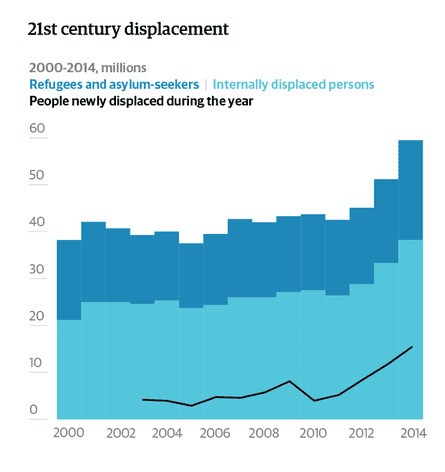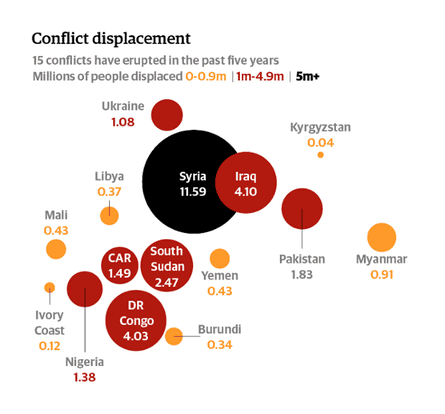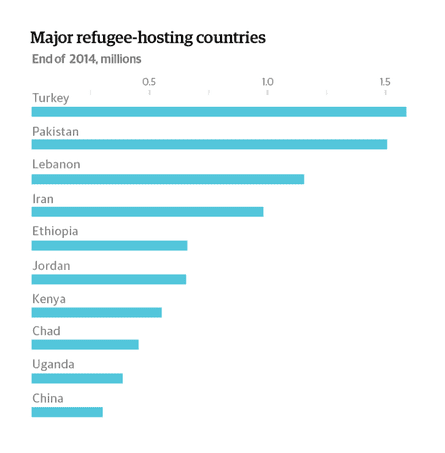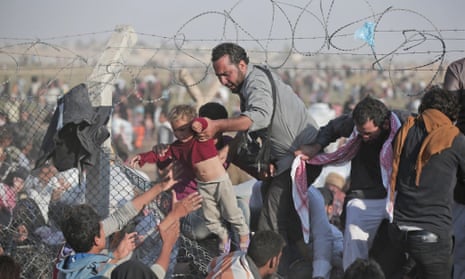War, violence and persecution left one in every 122 humans on the planet a refugee, internally displaced or seeking asylum at the end of last year, according to a stark UN report that warns the world is failing the victims of an “age of unprecedented mass displacement”.
The annual global trends study by the UN’s refugee agency, UNHCR, finds that the level of worldwide displacement is higher than ever before, with a record 59.5 million people living exiled from their homes at the end of 2014.
UNHCR estimates that an average of 42,500 men, women and children became refugees, asylum seekers or internally displaced people every day last year - a four-fold increase in just four years.
By the end of 2014, there were 19.5 million refugees – more than half of them children – 38.2 million internally displaced people and 1.8 million asylum-seekers.
Were the 59.5 million to be counted as the population of a single country, it would be the 24th largest in the world and one with about the same number of people as Italy.

The numbers are up 16% on 2013 – when the total stood at 51.2 million – and up 59% on a decade ago, when 37.5 million people were forced to flee their homes.
UNHCR says the four-year war in Syria is the single largest driver of displacement: by the end of 2014, the conflict had forced 3.88 million Syrians to live as refugees in the Middle East and beyond, and left 7.6 million more internally displaced. In blunter terms, one in every five displaced persons worldwide last year was Syrian.
The UN high commissioner for refugees, António Guterres, said that although the world was experiencing “an unchecked slide” into an era of massive forced global displacement, it seemed unwilling to tackle the causes.
“It is terrifying that on the one hand there is more and more impunity for those starting conflicts, and on the other there is [a] seeming utter inability of the international community to work together to stop wars and build and preserve peace,” he said.
The report also notes that the wealthy countries are relying overwhelmingly on poorer states to take in those who have been forced to abandon their homelands: in 2014, 86% of refugees were in regions or countries deemed economically less developed.
Twenty years ago, developing regions hosted about 70% of the world’s refugees; last year, countries ranked least developed by the UN were home to 3.6 million refugees – or 25% of the global total.
Guterres called on the international community to show resolve, tolerance and a proper financial commitment to helping those most in need.
“With huge shortages of funding and wide gaps in the global regime for protecting victims of war, people in need of compassion, aid and refuge are being abandoned,” he said.
“For an age of unprecedented mass displacement, we need an unprecedented humanitarian response and a renewed global commitment to tolerance and protection for people fleeing conflict and persecution.”
Guterres’ warning comes a year after the UNHCR reported that the number of people forced to flee their homes across the world had exceeded 50 million for the first time since the second world war.
At the end of 2014, 53% of all refugees under UNHCR’s responsibility came from just three countries: Syria (3.88 million), Afghanistan (2.59 million), and Somalia (1.11 million). A further 5.1 million refugees were registered by UNRWA, the UN agency for Palestinian refugees.

In Iraq, the march of Islamic State saw the number of internally displaced people jump from 1 million to in 2013 to 3.6 million by the end of last year. In Libya, 309,000 people were newly displaced in 2014.
Over the past five years, at least 15 conflicts have broken out or reignited: eight in Africa (Ivory Coast, Central African Republic, Libya, Mali, northeastern Nigeria, Democratic Republic of the Congo, South Sudan and Burundi); three in the Middle East (Syria, Iraq, and Yemen); one in Europe (Ukraine) and three in Asia (Kyrgyzstan, and in several areas of Burma and Pakistan).
With few of those conflicts resolved and most still forcing people to flee, just 126,800 refugees were able to return to their home countries last year – the lowest number in 31 years.
In Europe, the number of forcibly displaced people increased by 51% last year, rising from 4.4 million to 7.6 million.
“More than 219,000 refugees and migrants crossed the Mediterranean sea during 2014,” says the report. “That’s almost three times the previously known high of about 70,000, which took place in 2011 during the ‘Arab spring’. Nearly half of these arrivals were coming from the Syrian Arab republic and Eritrea. UNHCR has received information of over 3,500 women, men, and children reported dead or missing in the Mediterranean sea during the year, clearly demonstrating how dangerous and unpredictable this situation has become.”
UNHCR noted that the record number of Mediterranean crossings and the huge number of Syrians hosted by Turkey had “brought increased public attention, both positive and negative, to questions to do with refugees”, adding that Germany and Sweden had received the largest volume of asylum applications.
Displacement was up 19% in the Middle East and north Africa; up 17% in sub-Saharan Africa; up 31% in Asia, and up 12% in the Americas.

Last year saw Turkey overtake Pakistan to became the largest refugee-hosting country worldwide, with 1.59 million refugees, the overwhelming majority of them Syrian.
Pakistan hosted the second-largest number of refugees – 1.51 million, almost all of them from Afghanistan – while Lebanon took in the most refugees in relation to its population, with 232 refugees per 1,000 inhabitants.
Iran hosted 950,000 Afghan refugees, Ethiopia 659,500 refugees from South Sudan, Eritrea and Somalia, while Jordan hosted 654,100 refugees from Syria and Iraq.
Justine Greening, the international development secretary, said: “It is shocking that nearly 60 million people are now without a home and dependent on the kindness of strangers. One in seven of those men, women and children have been forced to flee because of conflict or persecution in the last year alone.
“From Syria to South Sudan, the UK is getting emergency help to people who have lost everything. I have met some of these people and they tell me they just want the chance to return to their homes and get back to normal.
“That is why, as we give these families the basics they need to survive – food, clean water and shelter – we must also tackle the root causes of poverty and instability, in particular economic development.”

Comments (…)
Sign in or create your Guardian account to join the discussion